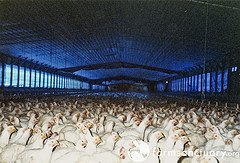
There’s an outbreak of illnesses from salmonella in chicken that is making national headlines–278 people in 18 states have been sickened. More alarming is the fact that 42% of those sickened have been hospitalized, and that the pathogen seems resistant to treatment with antibiotics. (According to estimates from the U.S. Centers for Disease Control, less than one per cent of its estimated 48 million cases of foodborne illness require hospitalization.)
The media is making much out of the fact that employees of the U.S. Centers for Disease Control are being called back from furlough to monitor the situation. But the media are ignoring the real dangers underscored by this outbreak.
This outbreak is a vivid example of the double standard applied to food safety–one set of highly permissive standards for corporate producers of factory food and a second set for small producers of artisanal nutrient-dense food. As if the favoritism shown the corporations that fatten politicians’ campaign coffers isn’t enough, we are now getting a bird’s-eye view (pardon the pun) of how the double standard is being allowed to truly endanger large numbers of people. It is a double standard I warn about and document in my book, Life, Liberty, and the Pursuit of Food Rights.
This outbreak should come as no surprise. It has been foretold by all manner of studies and surveys. In a number of tests, the most recent of which appears to have been 2009, Consumer Reports stated that about two-thirds of chicken purchased in supermarkets was contaminated with salmonella and/or campylobacter.
The pathogens are being rendered more dangerous by overuse of antibiotics. The CDC reported last month that two million people are becoming sick from antibiotic-resistant bacteria each year, with at least 23,000 deaths.
We know that 80% of antibiotics are used on farms, to compensate for unsanitary conditions and to encourage faster growth of animals.
Yet despite all the evidence that overuse of antibiotics on farm animals is creating serious dangers, the U.S. Food and Drug Administration has refused to seriously restrict antibiotic use on farms. Moreover, the USDA actually sanctions pathogens in chickens (according to food safety lawyer Bill Marler).
The one company linked to the current illnesses, Foster Farms, portrays itself as a cozy family-owned farming operation now in the fourth generation of Foster family ownership. But in point of fact it is a $2.24 billion behemoth–ranked number 201 in a Forbes survey of private companies for 2011.
It also has a curious view of pathogens in food, according to a press release it issued in response to the illnesses and the USDA’s identification of its chicken as a potential source of the illnesses. ” ‘Salmonella is naturally occurring in poultry and can be fully eradicated if raw product is properly handled and fully cooked,’ said Dr. Robert O’Connor, the company’s food safety chief and head veterinarian. All poultry producers strive to reduce bacterial presence, including Salmonella. We take food safety very seriously.” In other words, any problems, presumably including the current ones, are the fault of the consumer, not the company. And unanswered is this question: How is it that nearly 300 people all of a sudden failed to cook their chicken properly? And this: Is it possible the new salmonella are resistant to heat?
Moreover, according to the USA Today report on the current illnesses, Foster Farms hasn’t been required to recall any food. By the end of today, Foster Farms still hadn’t initiated a recall, or been forced into a recall, even though Consumer Reports said it found salmonella linked to the outbreaks in its own tests of Foster Farms chicken.
If you’ll remember the case of Morningland Dairy, the tiny Missouri cheese producer that was forced in 2010 by the FDA to recall all its products over the previous eight months after listeria was discovered in two packages of its cheese–this absent a single illness–and was shuttered by the Missouri Milk Board. Similarly, Estrella Cheese, a Washington raw cheese producer, was forced to recall cheese and shut down after listeria was found in cheese and equipment samples, also absent a single illness.
USA Today concluded its article with the quote from Foster Farms that salmonella “is naturally occurring in poultry” and observed, “Several European countries have succeeded in eradicating (salmonella) by stringent testing and eliminating any flock with an infected bird, but that is considered too costly to implement in the USA.”
Yes, too costly to the huge corporations that control the factory farming system.
David Gumpert is the author, most recently, of Life, Liberty, and the Pursuit of Food Rights: The Escalating Battle Over Who Decides What We Eat.
Reprinted with permission from The Complete Patient.
Flickr/Farm Sanctuary

